Abandoned babies given away on Pakistani TV programme
- Published
- comments
Orla Guerin reports on the controversial TV show which has awarded babies to two childless couples
Two baby girls who were abandoned in Pakistan's southern city of Karachi have been allocated new parents during a live television broadcast, the BBC's Orla Guerin reports.
At just over a month old Fatima has already lived through a lot.
Her life began, and could have ended, on a rubbish dump in the sprawling megacity of Karachi. Instead, Fatima was rescued by a charity and placed in the loving care of a childless couple.
It looks like a happy ending but it came about in the full glare of television cameras. The sleeping infant was one of two abandoned girls handed over during live broadcasts of "Amaan Ramzan", a blend of Islam and entertainment, which runs during the Muslim holy month of Ramadan.
Ratings concern
The dapper host Dr Aamir Liaquat Hussain is already famous for giving away cars, motorbikes and household electronics.
Now the controversial showman has added babies to the list, calling it "a noble cause". He insists he is saving abandoned infants, not using them to boost his ratings.
"We were already top of the ratings before we gave away a baby," said Dr Aamir, who describes himself as "truly a legend" on his website.
"These children are not a part of garbage, are not a part of trash, so we took these children from the garbage, from the trash, and delivered them to the needy people, the needy parents."
His show is broadcast from a packed studio, where the audience sits beneath glittering lanterns and a huge chandelier, and fish swim under glass panels in the floor. This is where the sleeping baby Fatima was handed over to her adoptive parents, who embraced her and wept.
Her new father Riaz, a bearded civil engineer, told us Fatima was the answer to his mother's prayers. She died the day before the broadcast.
He and his wife Tanzeem waited 14 long years for a child. He refused to divorce her, as many advised, when she could not produce a child.
"When the baby came into my arms on the show," he said, "it felt like another soul had entered my body, like an angel came. She has brought us so much peace. She means more to me than my own soul."
As he spoke, his wife tenderly cradled Fatima in her lap. "I adopted her," said Tanzeem, who wore a black chador, a full-body robe. "But it doesn't feel like an adoption. It feels as if she is my own child, as if I gave birth to her. She is a gift from God."
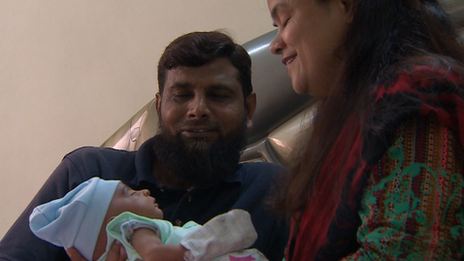
The civil engineer Riaz and his wife Tanzeem hold their newly-adopted child
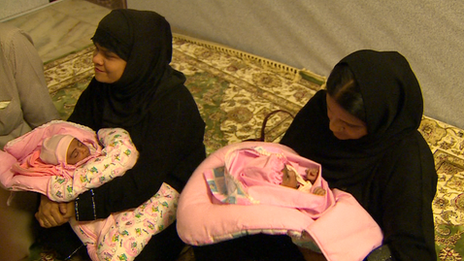
Tanzeem Ud Din and another woman, Soraya Bilquis, savour motherhood
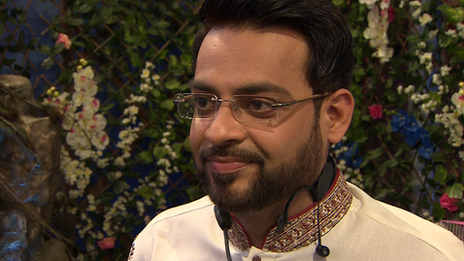
Dr Aamir Liaquat Hussain gives away cars and electrical goods on his TV shows
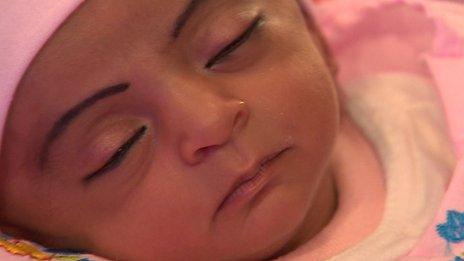
Fatima was left to die on a rubbish dump in Karachi
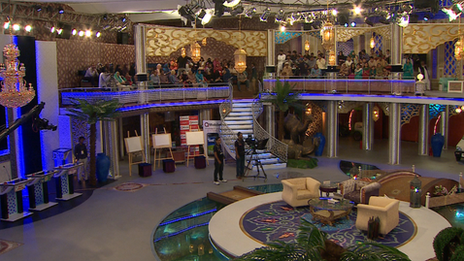
Fatima was handed over to her adoptive parents on the set of a TV show
Seated alongside her was another chador-clad woman now savouring motherhood - Soraya Bilquis. She and her husband waited even longer - 17 years - before getting a child of their own.
"My life is complete now because of her," she said, gazing down at baby Sayeda Zeinab. "I can't describe how happy I am because someone will grow up and call me mother. She is the light of my home."
Both couples said they saw nothing wrong with being given their daughters on live TV. Tanzeem said she hoped it would encourage others to adopt.
But child welfare advocates fear that other TV shows will copy the baby giveaway. They also worry that the lack of confidentiality could expose the children and their families to teasing and stigma in the future.
"The baby was given away the same way as a gift," said Seema Jamali, assistant director of child welfare for the Sindh provincial government.
"Though it was good to find parents for her, the baby was given like a car, laptop, or motorcycle. It's an insult to the baby and the parents. It should have been done quietly."
It was far from quiet, but it was quick. Both couples were vetted by a private charity, the Chhipa Welfare Association, in less than two weeks. That's a typical time frame here. Checks were carried out on their incomes, medical records, and homes, and there were investigations with the police, and in their communities.
'More transparent'
But the babies were handed over in a legal vacuum, with no regulation by the state. Experts say that's how most children are given new homes here. Adoption does not exist under Islamic law, but couples can apply to the courts to become legal guardians of unwanted babies. Few do.
It's time for a proper legal framework, according to Sharjeel Memon, information minister for Sindh. "We want to make this process more transparent," he told us, "and there must be some legislation that people should go through."
But here in Pakistan there has been no public outcry about the fact that babies were given away on a TV show. Many are glad that they have a new start in life.
Their stories could have ended very differently. More than 300 dead babies are found every year in Karachi alone by Pakistan's largest welfare organisation, the Edhi Foundation. In a 10-day period in July they found 23 tiny bodies. Some had been suffocated.
At their spotless and welcoming home, Fatima's parents keep watch over their precious gift. They take turns to kiss her forehead and arrange her blanket.
"I have hardly had more than two hours' sleep a night since she came," said Riaz, smiling broadly. "We hope she will grow up to be a religious scholar, or maybe an engineer like me." As he spoke Fatima yawned, stirred, and clenched a little fist.
- Published25 July 2013
- Published17 July 2013
- Published27 June 2013